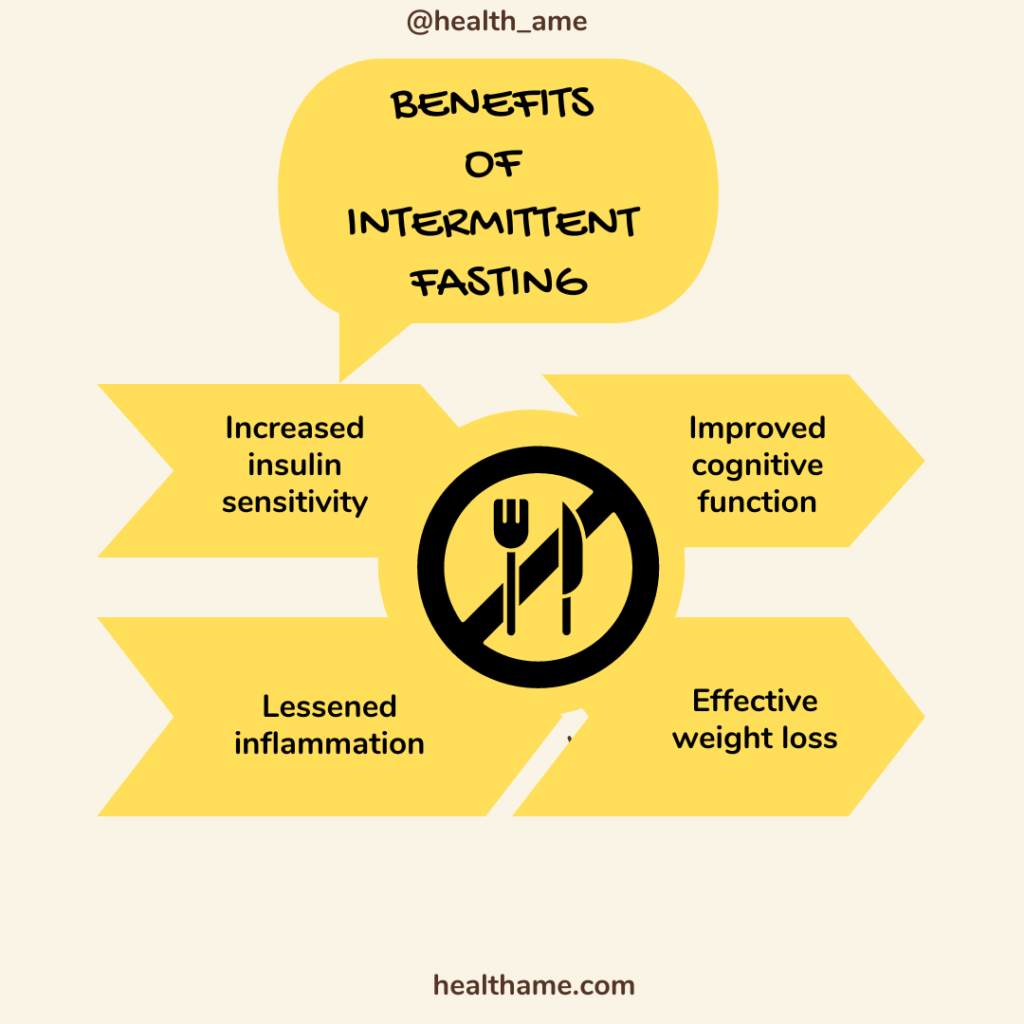The possible health advantages of intermittent fasting have contributed to its rising popularity.
While individual results may vary, the following are some potential advantages of intermittent fasting:
- Weight loss: By causing a calorie deficit, intermittent fasting can help people consume fewer calories and encourage weight loss. It is simpler to manage total calorie intake when the eating window is constrained.
- Increased insulin sensitivity: By improving insulin sensitivity, intermittent fasting may make it possible for the body to utilize glucose more effectively. For treating and avoiding diseases like type 2 diabetes, this can be helpful.
- Lessened inflammation: According to some studies, intermittent fasting may help lower the body’s levels of inflammation, which are linked to a number of chronic conditions like cancer and heart disease.
- Cellular repair and autophagy: The body may go into a state of autophagy during fasting periods, which is a process whereby outdated or damaged cells are digested and recycled. This cellular repair process may help people live longer and prevent sickness.
- Improved cognitive function: Some studies suggest that intermittent fasting may have positive effects on cognition. It might encourage the synthesis of brain-derived neurotrophic factor (BDNF), a protein that encourages the development of new neurons and might offer protection from neurodegenerative illnesses.
- More energy: For some people, intermittent fasting may result in more energy and better mental clarity. This effect might be influenced by stable blood sugar levels and ketone synthesis during fasting times.
- Clarity and adaptability: Traditional calorie-restricted diets are not as effective as intermittent.
It’s crucial to remember that not everyone can benefit from intermittent fasting, especially people with specific medical conditions, women who are pregnant or nursing, and people who have a history of eating disorders. Before beginning intermittent fasting, as with any dietary adjustment, it is essential to speak with a healthcare provider to be sure it fits your unique needs and circumstances.
How to plan for intermittent fasting
Following these crucial steps will help you successfully adopt intermittent fasting into your daily routine:
- Select the Appropriate Intermittent Fasting Technique:
- Learn about other intermittent fasting strategies, including the 16/8 approach, the 5:2 strategy, and alternate-day fasting.
- When choosing the best fasting technique for you, take into account your lifestyle, preferences, and health goals.
- Begin Slowly:
- To help your body acclimatize, start by expanding your fasting intervals gradually over time.
- Begin with shorter fasting intervals—say, 12 hours—and progressively extend them when you feel more at peace.
- Establish Your Fasting-to-Eating Ratio: • Select the fasting-to-eating ratio that is most effective for you.
- The 16/8 strategy, for instance, calls for a 16-hour fast followed by an 8-hour eating window.
- Maintain sufficient Hydration: To maintain sufficient hydration throughout the day, both when fasting and when eating, drink lots of water. You can also have herbal tea, black coffee, or other non-caloric beverages while fasting.
- Managing Hunger and Cravings: • Recognise that while initially common, hunger and cravings tend to lessen as your body becomes used to the fasting schedule.
- Engage in activities to keep oneself busy and stave off cravings and hunger.
- If required, incorporate quick, wholesome snacks into your eating window to help you stay on track.
- Put an emphasis on nutrient-rich meals: To make sure you’re getting the nutrition you need, plan balanced meals inside your eating window.
- Choose a wide range of whole foods, such as lean proteins, fruits, vegetables, whole grains, and healthy fats.
- Give nutrient-dense foods top priority to enhance your general health and wellbeing.
- Include exercise: Exercise can assist preserve muscle mass, enhance metabolism, and support general health. It should be done on a regular basis in addition to intermittent fasting.
- For best results, find an exercise routine that coincides with your fasting and eating times.
- Maintain Consistency: When engaging in intermittent fasting, consistency is essential.
- Be as consistent as you can with your selected fasting and eating schedule to give your body time to adjust and reap the benefits.
- Track Your Progress and Pay Attention to Your Body: • Keep a notebook to record your progress, as well as how you feel when you’re fasting and when you’re eating.
- Pay close attention to your body’s cues and modify your fasting schedule as necessary.
- Consult a healthcare provider if you feel any persistent discomfort or negative consequences.
- Seek Support and Guidance: • To find support, inspiration, and a place to share experiences, think about joining communities or online groups that are dedicated to intermittent fasting.
- Speak with a trained dietitian or member of the medical profession to be sure intermittent fasting fits your specific needs and objectives.
Keep in mind that not everyone can practice intermittent fasting, especially if they have underlying medical issues or special nutritional needs. Prioritize your health, pay attention to your body, and get medical advice if you have any worries before beginning an intermittent fasting schedule.
Disclaimer: This content provides our option. It is in no way a substitute for a qualified medical or specialist opinion.
Always consult a specialist or your own doctor for more information.







